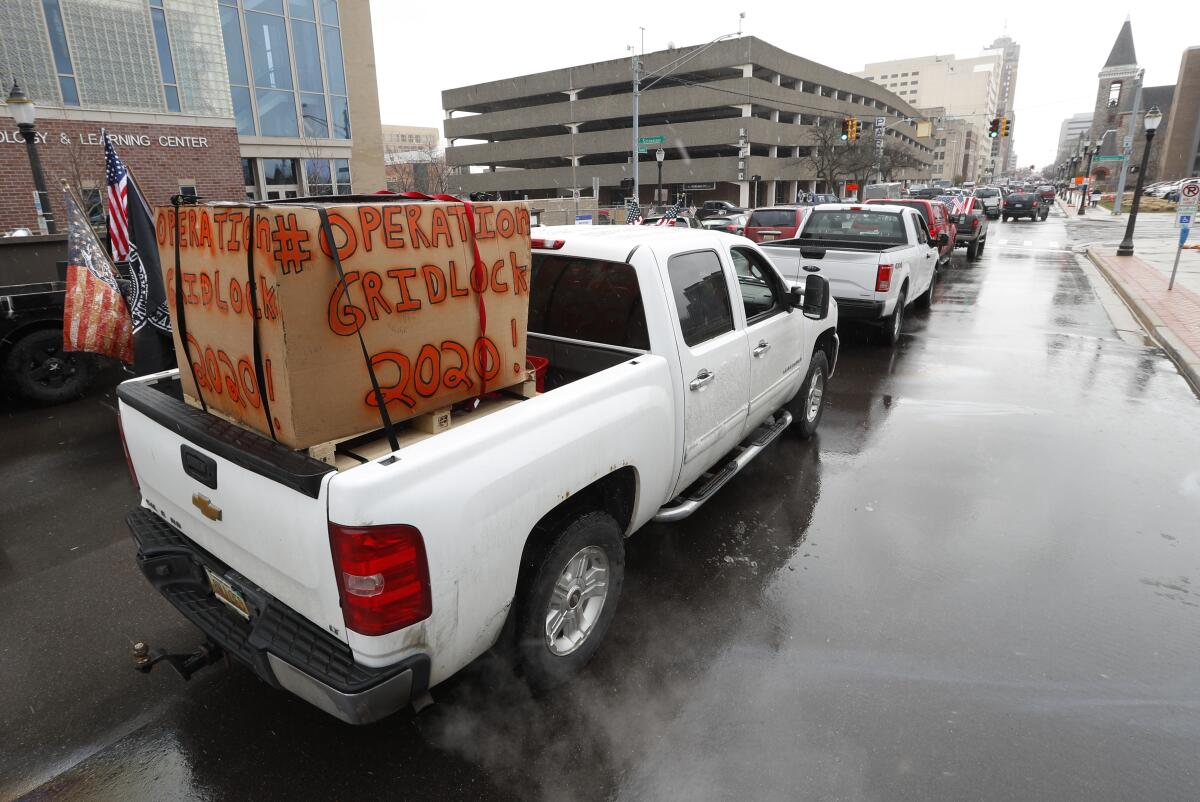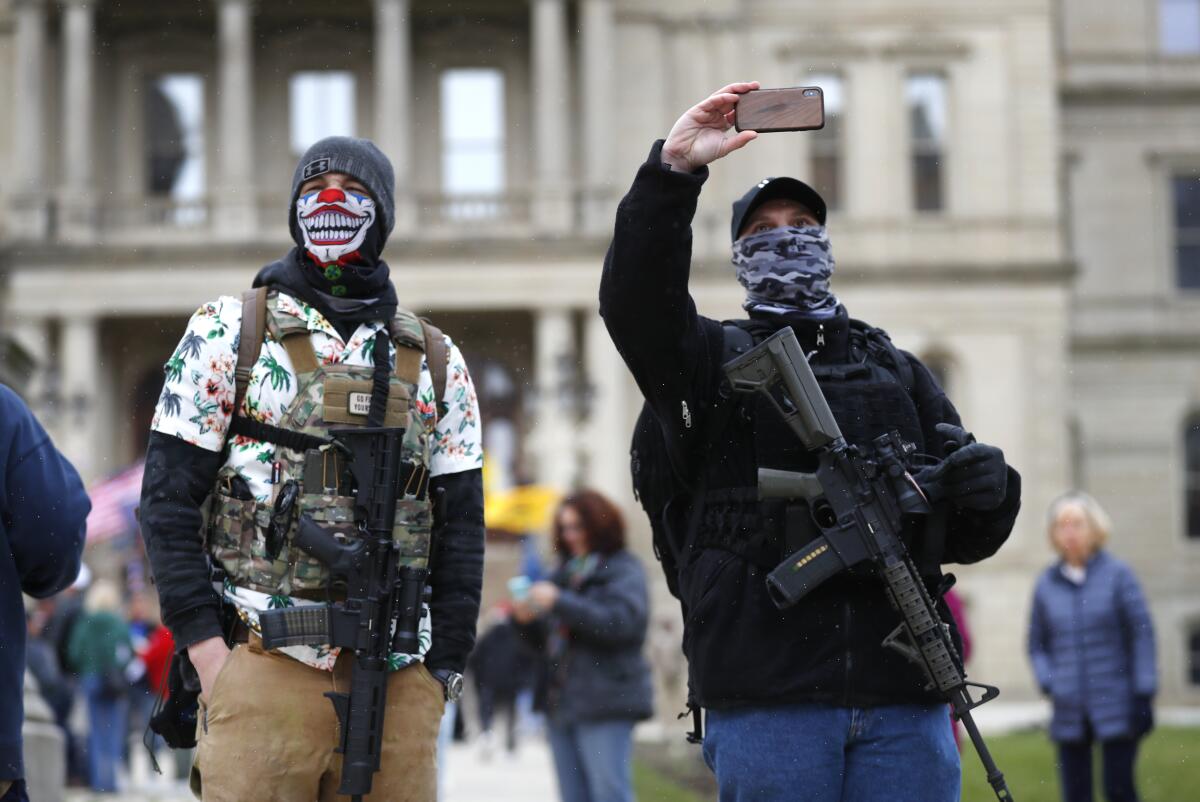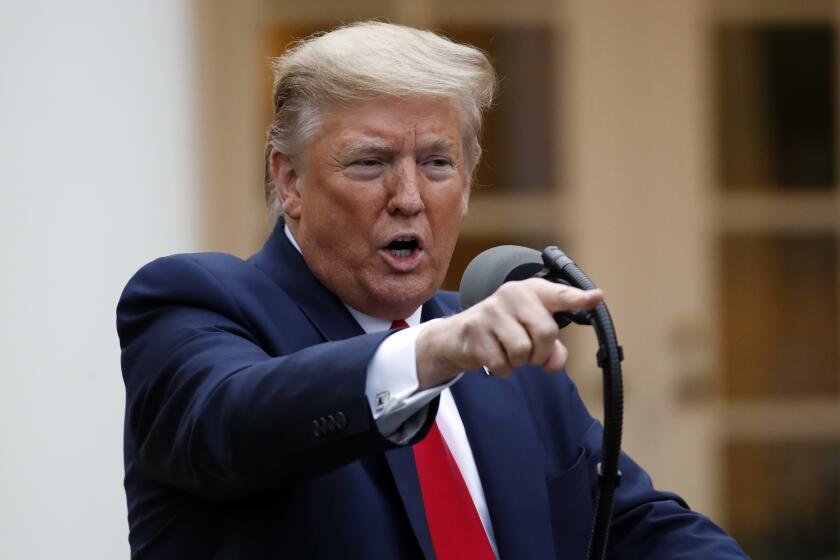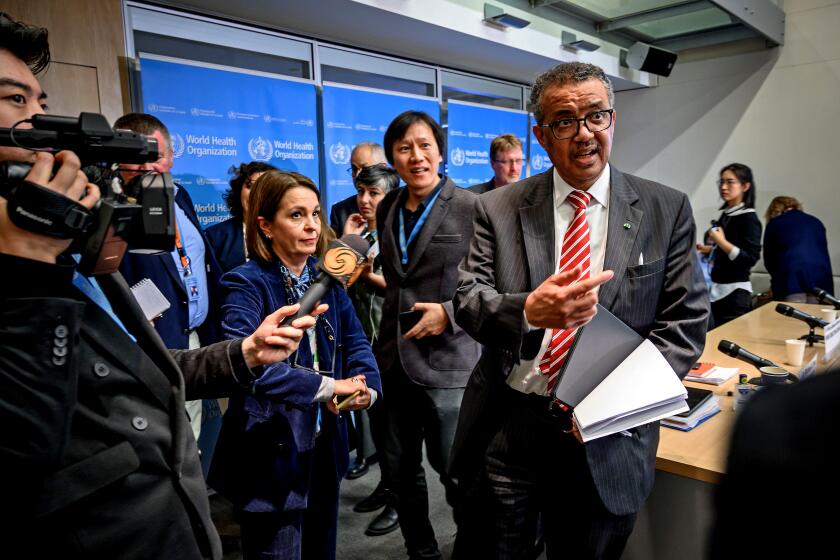Protests and pleas: Reactions in U.S. vary wildly to coronavirus restrictions
The daily flood of statistics related to the COVID-19 pandemic, a compendium of numbers both promising and ominous, triggered starkly different reactions in different parts of the nation on Wednesday.
Government leaders in Virginia, Idaho and Washington, D.C., announced they will extend coronavirus restrictions for several weeks in hopes of containing the outbreak’s spread.
But Idaho also will allow some businesses with curbside delivery to reopen by the end of the month. And flag-waving protesters gathered outside government buildings in Michigan and Kentucky to voice their anger at stay-home orders.
New York Mayor Bill de Blasio, who issued new guidelines requiring shoppers to wear face coverings, warned that no one should be misled by early signs that hot spots across the country are flattening the curve of new COVID-19 cases.
“No one should think we’ve got this perfect trend going in the right direction,” De Blasio said during a morning news conference. “We do not know where this disease is going.”
U.S. totals have now risen to more than 634,000 confirmed cases and more than 27,900 deaths, far outnumbering any other country, according to Johns Hopkins University. Tuesday marked the deadliest day in the U.S. since the start of the pandemic, with 2,405 deaths.
New Jersey reported only a slight dip in its daily death toll on Wednesday, at 351. “This is a war,” Gov. Phil Murphy said. “It’s the fight of our lives.”
But the situation in New York City suggests that making sense of coronavirus statistics can be difficult. This week, the city’s official death toll rose dramatically when health authorities began including people who may have had COVID-19 but died without being tested.
With more than 7,900 deaths confirmed or suspected of being caused by COVID-19, De Blasio said, hospital workers have been too overwhelmed to fully assess every case, often rushing from the deceased to patients who need emergency care.
“Clearly, so many people have passed away,” he said. “It was bigger than we fully understood or could document, and I think it will be bigger still.”
Three months into the coronavirus pandemic, the U.S. still lacks an effective testing system. Each step in the process involves bottlenecks.
In the nation’s capital, which has reported 72 deaths, Mayor Muriel Bowser called for stay-at-home restrictions to remain in place until at least mid-May, saying, “If we need to extend it beyond that, we certainly will.”
New Orleans took similar action, and Massachusetts officials emphasized the need for continued social distancing in the midst of a surge in their state. Boston Mayor Marty Walsh predicted that daily deaths in his city might not reach their peak until the end of the month.
“So I think we’re still in the beginning stages,” he said. “For a lot of us, it’s kind of getting used to this way of life.”
Protesters in Lexington, Ky., had a different perspective, reportedly shouting loudly enough to be heard inside the Capitol. In Lansing, Mich., demonstrators took to the streets, snarling traffic as part of an “Operation Gridlock” rally.


Though Michigan has reported more than 1,760 deaths — third-most in the U.S. — the protesters contend Gov. Gretchen Whitmer, a Democrat, went too far in extending a stay-at-home order that, among other things, shuttered indoor restaurants and placed limits on people allowed to work outside the home.
“This arbitrary blanket spread of shutting down businesses, about putting all of these workers out of business, is just a disaster. It’s an economic disaster for Michigan,” said Meshawn Maddock, one of the protesters. “And people are sick and tired of it.”
Most of the protesters reportedly stayed in their cars, though others ventured onto the sidewalk and stood close together, disregarding social distancing.
“I support your right to free speech and I respect your opinions,” Whitmer said during a news conference. “I just urge you, don’t put yourself at risk and don’t put others at risk either … we know that this rally endangered people.”
In combating the coronavirus pandemic, Trump’s America-first policies and testy relations with other leaders contributed to a lack of coordination.
Republican lawmakers in Michigan and some other states have sought to loosen restrictions. There had been public protests in Ohio and North Carolina earlier in the week.
The partisan nature of some discussions around the coronavirus outbreak has continued in the wake of angry words between President Trump and state governors this week.
Trump initially claimed to hold “total authority” over loosening restrictions nationwide, prompting New York Gov. Andrew Cuomo to say: “We do not have a king in this country.”
Though the president subsequently backed down from his stance, De Blasio weighed in on Wednesday, calling the pandemic a “litmus test” for Trump.
“It’s up to him now to provide leadership,” the mayor said. “Is he going to be there for his hometown or not? Is he going to be there for everyone else?”
The Associated Press contributed to this report.
More to Read
Sign up for Essential California
The most important California stories and recommendations in your inbox every morning.
You may occasionally receive promotional content from the Los Angeles Times.













